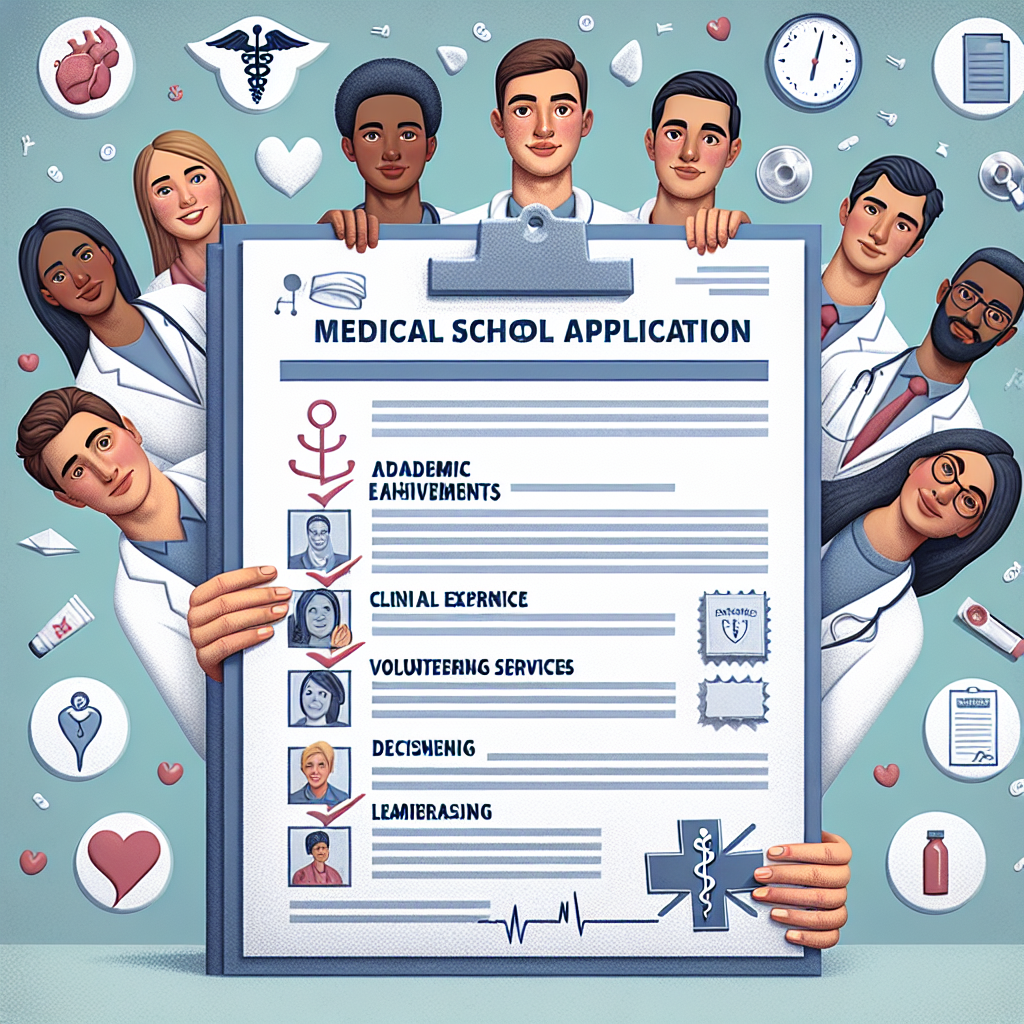Highlighting Leadership Skills in Your Medical School Application

Applying to medical school is a rigorous process that requires candidates to showcase a diverse set of skills and experiences. Among these, leadership skills are particularly valued as they demonstrate an applicant’s ability to manage, inspire, and guide others—qualities essential for a successful career in medicine. This article explores how to effectively highlight leadership skills in your medical school application, providing detailed insights and strategies to enhance your candidacy.
Understanding the Importance of Leadership in Medicine
Leadership in medicine is not just about holding a title or position; it involves influencing and guiding others towards achieving common goals. In the medical field, effective leadership can lead to improved patient outcomes, enhanced team collaboration, and innovative solutions to complex problems. Medical schools seek applicants who possess these qualities, as they are indicative of future success in the field.
Leadership in medicine can manifest in various forms, such as:
- Leading a research project or clinical trial
- Organizing community health initiatives
- Mentoring peers or junior colleagues
- Advocating for policy changes in healthcare
Understanding the multifaceted nature of leadership in medicine is crucial for applicants. It allows them to identify and articulate their own leadership experiences effectively in their applications.
Case Study: Dr. Atul Gawande
Dr. Atul Gawande, a renowned surgeon and public health researcher, exemplifies leadership in medicine. His work in improving surgical safety and advocating for healthcare reform has had a significant impact on the medical community. By leading initiatives such as the World Health Organization’s Surgical Safety Checklist, Dr. Gawande has demonstrated how leadership can drive systemic change and improve patient care.
Applicants can draw inspiration from such leaders by identifying similar qualities and experiences in their own journeys. Highlighting these in their applications can set them apart from other candidates.
Identifying Your Leadership Experiences
Before you can effectively highlight your leadership skills, you need to identify and reflect on your experiences. This involves a thorough self-assessment of your past roles and responsibilities, both formal and informal, that demonstrate leadership qualities.
Consider the following questions to help identify your leadership experiences:
- Have you led a team or project in an academic, professional, or volunteer setting?
- Have you initiated or organized events or programs that required coordination and management?
- Have you mentored or guided others, either formally or informally?
- Have you advocated for change or improvement in any setting?
Once you have identified your leadership experiences, it’s important to reflect on the impact you had in those roles. Consider the outcomes of your leadership efforts and how they contributed to the success of the team or project.
Example: Leading a Community Health Initiative
Suppose you led a community health initiative aimed at increasing awareness about diabetes prevention. In this role, you organized workshops, collaborated with local healthcare providers, and engaged with community members to promote healthy lifestyle choices. By highlighting this experience in your application, you can demonstrate your ability to lead, communicate effectively, and make a positive impact on public health.
When describing such experiences, focus on the skills you utilized, such as communication, problem-solving, and teamwork. Provide specific examples of challenges you faced and how you overcame them, as this will illustrate your resilience and adaptability as a leader.
Effectively Communicating Leadership Skills in Your Personal Statement
The personal statement is a critical component of your medical school application, offering an opportunity to convey your leadership skills and experiences in a compelling narrative. Crafting a well-written personal statement requires careful planning and reflection.
Here are some strategies to effectively communicate your leadership skills in your personal statement:
- Start with a Strong Opening: Capture the reader’s attention with a compelling story or anecdote that highlights a pivotal leadership experience. This sets the tone for the rest of your statement and engages the reader from the outset.
- Focus on Impact: Describe the impact of your leadership efforts on others and the outcomes achieved. Use specific examples to illustrate how your actions led to positive change or improvement.
- Highlight Key Skills: Identify the key leadership skills you demonstrated, such as communication, decision-making, and conflict resolution. Explain how these skills are relevant to a career in medicine.
- Reflect on Personal Growth: Discuss how your leadership experiences have contributed to your personal and professional growth. Reflect on the lessons learned and how they have prepared you for a career in medicine.
- Conclude with a Vision: End your personal statement with a forward-looking vision of how you plan to apply your leadership skills in medical school and beyond. This demonstrates your commitment to continuous growth and development.
By following these strategies, you can create a personal statement that effectively showcases your leadership skills and sets you apart from other applicants.
Example: Personal Statement Excerpt
“During my undergraduate studies, I had the opportunity to lead a team of volunteers in organizing a health fair for underserved communities. This experience taught me the importance of effective communication and collaboration in achieving common goals. By coordinating with local healthcare providers and engaging with community members, we were able to provide valuable health screenings and education to over 500 individuals. This experience not only strengthened my leadership skills but also reinforced my commitment to addressing healthcare disparities. As I pursue a career in medicine, I am eager to continue leveraging my leadership abilities to make a meaningful impact on patient care and public health.”
Leveraging Extracurricular Activities to Demonstrate Leadership
Extracurricular activities provide a valuable platform for demonstrating leadership skills outside of the classroom. Whether through student organizations, volunteer work, or sports teams, these experiences offer opportunities to take on leadership roles and make a positive impact.
When highlighting extracurricular activities in your application, consider the following tips:
- Select Relevant Activities: Choose activities that align with your interests and career goals in medicine. This demonstrates a genuine commitment to the field and provides context for your leadership experiences.
- Emphasize Leadership Roles: Highlight any leadership positions you held within these activities, such as president of a student organization or captain of a sports team. Describe your responsibilities and the impact you had in these roles.
- Showcase Teamwork and Collaboration: Leadership often involves working collaboratively with others. Highlight instances where you successfully led a team or worked with others to achieve a common goal.
- Provide Quantifiable Outcomes: Whenever possible, provide quantifiable outcomes of your leadership efforts, such as the number of participants in an event or the amount of funds raised for a cause. This adds credibility to your achievements.
- Reflect on Personal Development: Discuss how your involvement in extracurricular activities has contributed to your personal and professional growth. Reflect on the skills you developed and how they have prepared you for a career in medicine.
By effectively leveraging extracurricular activities, you can demonstrate a well-rounded profile that highlights your leadership skills and commitment to the medical field.
Example: Leadership in a Student Organization
As the president of the Pre-Medical Society at your university, you organized events and workshops to support fellow pre-med students in their academic and professional journeys. By collaborating with faculty members and healthcare professionals, you provided valuable resources and networking opportunities for your peers. This experience not only honed your leadership skills but also reinforced your passion for mentoring and supporting others in their pursuit of a medical career.
When describing such experiences in your application, focus on the skills you utilized, such as communication, organization, and problem-solving. Provide specific examples of challenges you faced and how you overcame them, as this will illustrate your resilience and adaptability as a leader.
Utilizing Letters of Recommendation to Highlight Leadership
Letters of recommendation are a crucial component of your medical school application, providing an external perspective on your skills and experiences. When selecting recommenders, choose individuals who can speak to your leadership abilities and provide specific examples of your impact.
Here are some tips for utilizing letters of recommendation to highlight your leadership skills:
- Select the Right Recommenders: Choose recommenders who have observed your leadership skills firsthand, such as professors, supervisors, or mentors. Ensure they can provide specific examples of your leadership experiences and impact.
- Provide Context and Guidance: When requesting a letter of recommendation, provide your recommenders with context about your leadership experiences and the skills you wish to highlight. This will help them craft a more detailed and relevant letter.
- Highlight Key Leadership Qualities: Encourage your recommenders to focus on specific leadership qualities you demonstrated, such as communication, decision-making, and teamwork. Ask them to provide examples of how you applied these skills in various settings.
- Emphasize Impact and Outcomes: Request that your recommenders highlight the impact of your leadership efforts and the outcomes achieved. This adds credibility to your achievements and demonstrates your ability to make a positive impact.
- Express Gratitude: After receiving a letter of recommendation, express your gratitude to your recommenders for their support and guidance. This not only strengthens your relationship with them but also reflects positively on your character.
By utilizing letters of recommendation effectively, you can provide a comprehensive and compelling portrayal of your leadership skills to medical school admissions committees.
Example: Letter of Recommendation Excerpt
“As the faculty advisor for the Health Outreach Program, I had the pleasure of working closely with [Applicant’s Name] during their tenure as program coordinator. [Applicant’s Name] demonstrated exceptional leadership skills by organizing health fairs and workshops that reached over 1,000 community members. Their ability to communicate effectively with diverse stakeholders and manage a team of volunteers was instrumental in the program’s success. I am confident that [Applicant’s Name] will continue to excel as a leader in the medical field.”
Conclusion
Highlighting leadership skills in your medical school application is essential for demonstrating your potential as a future physician. By understanding the importance of leadership in medicine, identifying your leadership experiences, effectively communicating them in your personal statement, leveraging extracurricular activities, and utilizing letters of recommendation, you can create a compelling application that sets you apart from other candidates.
Remember, leadership is not just about holding a title or position; it involves influencing and guiding others towards achieving common goals. By showcasing your leadership skills and experiences, you can demonstrate your ability to make a positive impact in the medical field and inspire others to do the same.
As you embark on your journey to medical school, continue to seek out opportunities to develop and refine your leadership skills. Whether through academic, professional, or volunteer experiences, each opportunity provides a chance to grow and make a meaningful impact on the world around you.





